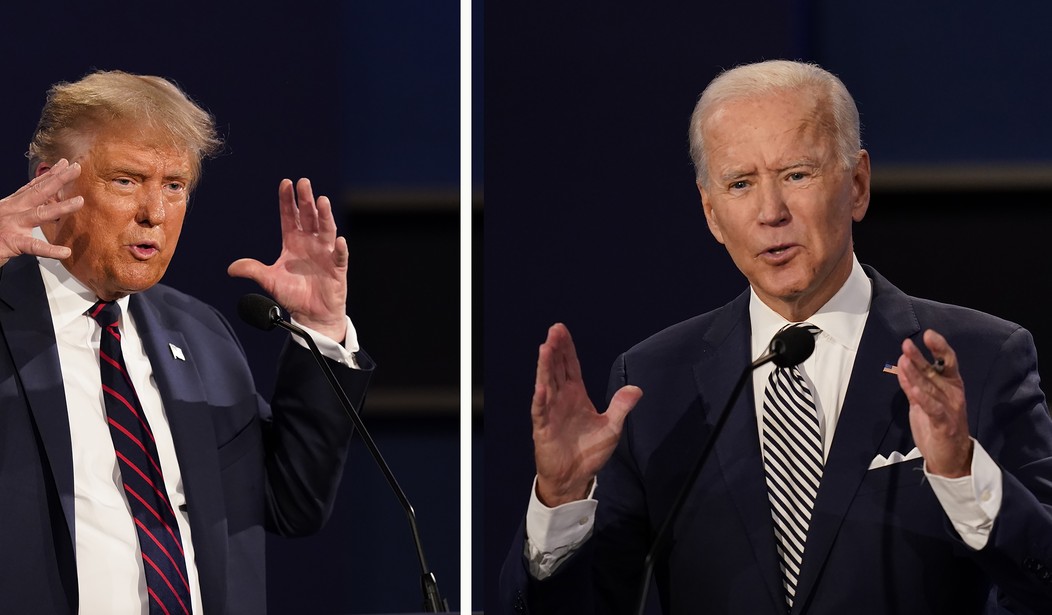When Amy Coney Barrett was nominated to a judgeship on the U.S. Court of Appeals in 2017, Sen. Dianne Feinstein was taken aback by the Notre Dame law professor's Catholic convictions about the right to life.
"Professor," said Feinstein, "when you read your speeches, the conclusion one draws is that the dogma lives loudly within you, and that's of concern."
Feinstein, the ranking Democrat on the Senate Judiciary Committee, got a second chance to quiz Barrett during the Supreme Court nomination hearings conducted by Chairman Lindsey Graham.
Believing, after four days, that she and her colleagues had been treated fairly, Feinstein volunteered across the aisle, "This is one of the best set of hearings that I've participated in."
She gave Graham, a friend and colleague of decades, a brief hug.
To shocked Democrats, however, this was collusion, consorting with the enemy in a time of war.
The abortion-rights lobby NARAL demanded her removal as ranking Democrat. Minority Leader Chuck Schumer indicated that he had taken the Senate's oldest member to the woodshed.
"I've had a long and serious talk with Sen. Feinstein," said Schumer, "That's all I'm going to say about it right now."
Brian Fallon, executive director of Demand Justice, called on Feinstein to resign from the Judiciary Committee.
Because the 87-year-old Feinstein complimented a colleague of two decades for a fair hearing, and then hugged him, she is in peril of being purged from her position on the Judiciary Committee by her own party.
Recommended
Apparently, graciously thanking Republicans is a capital offense in a Democratic caucus, some of whose members endlessly babble on about the need "to work together across party lines."
But the Jacobin spirit is alive and well not only among Democratic elites. Maryland Gov. Larry Hogan, a Republican critic of Donald Trump, has said he did not cast his ballot either for the president or for Joe Biden but wrote in Ronald Reagan, the last Republican to carry his state in 1984.
Though he had walked away from a president of his own party, Hogan has been denounced for not going all the way and voting for Biden.
"Clownish, childish, an act of cowardice" sums up the reaction of some of the "Never Trumpers" who are hoping for a crushing humiliation on Nov. 3 of the Trump-led party they have abandoned.
What these episodes suggest is that the idea of bipartisan comity, or some new era of national unity should Biden win, is self-delusion.
Should Trump be defeated, his loyalists will neither forgive nor forget the Republican defectors who endorsed Biden any more than the Goldwater Republicans of 1964 forgave or forgot the Rockefeller Republicans who abandoned Mr. Conservative.
A dozen years later, the Goldwaterites were in Kansas City plotting, demanding, and then celebrating the dumping of Vice President Rockefeller from the ticket of President Gerald Ford.
Indeed, the splintering of both parties has been made broader and deeper by the events of 2020.
First, the battle over how to fight the coronavirus has created a new divide.
Those who insist on opening up the economy are attacked for seeking herd immunity at a cost of hundreds of thousands of lives. Trump and his backers have been accused of mass murder.
And during the summer of 2020, the Black Lives Matter- and antifa-fueled riots, looting, arson and assaults on cops went on for weeks, destroying billions of dollars in property and ending with demands to "defund the police."
Scores of statues have been toppled and destroyed -- statues of explorers, missionaries, Founding Fathers of the republic and presidents on Mount Rushmore.
This rampage of iconoclasts reveals a belief among many of the nation's young that "The Making of America" they were taught about in history books in schools was a pack of lies.
By their words and deeds, they profess America to have been the creation of racist white colonialists who enslaved Africans and brought them here to do the hard labor as they perpetrated genocide against the indigenous peoples they encountered when they came to settle and claim these lands.
These new divides in our society, manifest in 2020, are piled upon old divisions dating back decades. Now, not only are we fractured over ideology, religion, race, culture and morality, but also our country's history has become a cause of irreconcilable conflict.
In Federalist 2, John Jay wrote of the new nation that was crafting its Constitution: "Providence has been pleased to give this one connected country to one united people -- a people descended from the same ancestors, speaking the same language, professing the same religion, attached to the same principles of government, very similar in their manners and customs..."
What Jay described has disappeared in the polyglot America of 2020. And while that nation became the greatest republic in the history of mankind, the future for this land of ceaseless collision and conflict seems not so bright.
Patrick J. Buchanan is the author of "Nixon's White House Wars: The Battles That Made and Broke a President and Divided America Forever."

























Join the conversation as a VIP Member